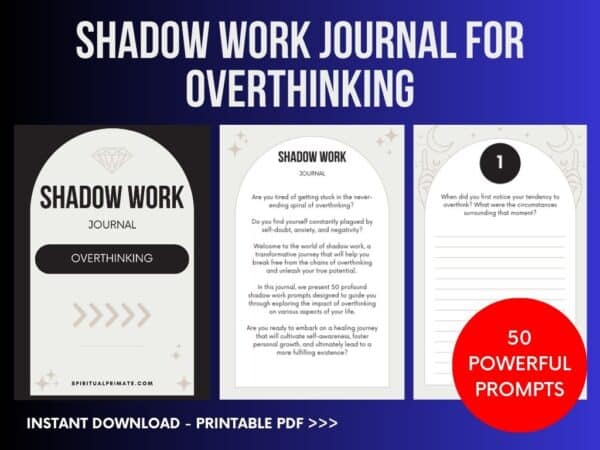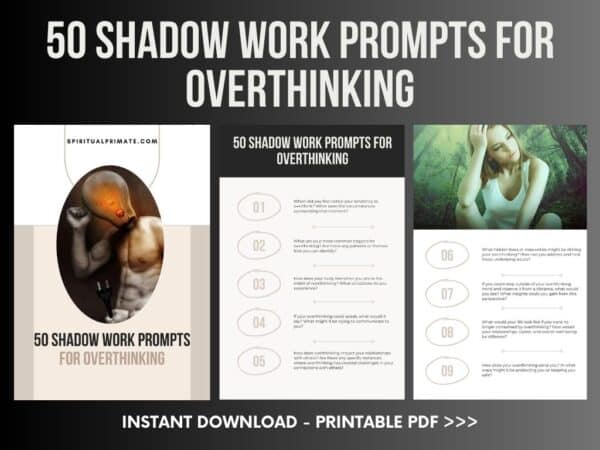Are you tired of getting stuck in the never-ending spiral of overthinking? Do you find yourself constantly plagued by self-doubt, anxiety, and negativity?
Welcome to the world of shadow work, a transformative journey that will help you break free from the chains of overthinking and unleash your true potential. In this article, we present 50 profound shadow work prompts designed to guide you through exploring the impact of overthinking on various aspects of your life.
Are you ready to embark on a healing journey that will cultivate self-awareness, foster personal growth, and ultimately lead to a more fulfilling existence?

Overthinking: An Excessive and Unproductive Mental Habit
Have you ever found yourself lost in a spiral of thoughts, analyzing every detail of a situation, or constantly worrying about the future? If so, you’ve experienced overthinking.
Overthinking is the process of dwelling on a problem, decision, or situation excessively, often creating a mental loop that makes it difficult to focus on anything else. It’s like a hamster running tirelessly on a wheel, with your mind going round and round without reaching a solution or resolution.
While it’s normal for our brains to analyze information and make thoughtful decisions, overthinking takes this process to an extreme. Instead of providing clarity, it often leads to feelings of stress, anxiety, and self-doubt. Overthinkers may struggle with decision-making and experience difficulty in letting go of past mistakes or uncertainties about the future.
The key to overcoming overthinking is to recognize when your thoughts are spiraling out of control and to develop healthy coping strategies. This might include practicing mindfulness, setting aside specific times for reflection, or seeking support from friends, family, or a mental health professional.
In summary, overthinking is an excessive and unproductive mental habit that can negatively impact our well-being. By learning to recognize and manage it, we can free ourselves from the endless loop of worry and enjoy a more balanced, present-focused life.

Shadow Work and Overcoming Overthinking: A Path to Personal Growth
Overthinking is a common issue that many people face, often leading to stress, anxiety, and self-doubt. While it’s crucial to acknowledge and address the root causes of overthinking, one effective method to overcome this issue is through the practice of shadow work.
What is Shadow Work?
Shadow work is a self-discovery process that involves exploring and integrating the hidden, unconscious aspects of our personality. These “shadows” may include repressed feelings, past traumas, or unresolved issues that influence our thoughts, beliefs, and behaviors. By confronting and embracing these aspects of ourselves, we can gain a deeper understanding of our psyche and achieve emotional balance.
How Shadow Work Can Help Overcome Overthinking
1. Uncovering the Root Cause: Overthinking often stems from unresolved issues or suppressed emotions. Through shadow work, individuals can delve into their unconscious mind to identify the root causes of their overthinking patterns. By understanding and addressing these underlying issues, one can break the cycle of overthinking and experience greater mental clarity.
2. Embracing Emotional Balance: Overthinking can create an imbalance in our emotional state, leading to heightened anxiety and stress. Shadow work encourages individuals to acknowledge and accept both positive and negative emotions, fostering a sense of emotional balance. This balanced perspective can help reduce overthinking by allowing one to process their emotions in a healthier manner.
3. Developing Mindfulness and Self-Awareness: Shadow work cultivates mindfulness and self-awareness, which are essential tools in combating overthinking. As one becomes more aware of their thought patterns and emotional triggers, they can more easily recognize when they are slipping into overthinking habits. This increased self-awareness can empower individuals to redirect their thoughts and develop healthier coping strategies.
4. Building Self-Compassion: Overthinking often involves harsh self-criticism and negative self-talk. Shadow work encourages individuals to embrace self-compassion, allowing them to recognize their own worth and develop a more positive self-image. By cultivating self-compassion, one can counteract the negative thought patterns that contribute to overthinking.
5. Enhancing Personal Growth: Shadow work is a pathway to personal growth, as it allows individuals to confront, understand, and integrate their unconscious mind. By working through the shadows, one can develop a deeper understanding of themselves and their behaviors. This self-discovery process can lead to personal growth and transformation, which in turn can help to reduce overthinking and promote overall well-being.
In conclusion, shadow work is an effective approach to overcoming overthinking by addressing the root causes, fostering emotional balance, and promoting self-awareness and self-compassion. By engaging in shadow work, individuals can break free from the cycle of overthinking and experience personal growth and transformation. By confronting and embracing our shadows, we can pave the way for a more balanced, self-aware, and compassionate life.

Shadow Work Prompts for Overthinking
1. When did you first notice your tendency to overthink? What were the circumstances surrounding that moment?
2. What are your most common triggers for overthinking? Are there any patterns or themes that you can identify?
3. How does your body feel when you are in the midst of overthinking? What sensations do you experience?
4. If your overthinking could speak, what would it say? What might it be trying to communicate to you?
5. How does overthinking impact your relationships with others? Are there any specific instances where overthinking has created challenges in your connections with others?
6. What hidden fears or insecurities might be driving your overthinking? How can you address and heal these underlying issues?
7. If you could step outside of your overthinking mind and observe it from a distance, what would you see? What insights could you gain from this perspective?
8. What would your life look like if you were no longer consumed by overthinking? How would your relationships, career, and overall well-being be different?
9. How does your overthinking serve you? In what ways might it be protecting you or keeping you safe?
10. What are some healthy coping mechanisms that you can use to replace overthinking? How can you practice these strategies in your daily life?
11. How do your core beliefs and values contribute to your overthinking? Are there any beliefs that you need to challenge or reevaluate?
12. In what ways has overthinking prevented you from taking risks or pursuing your dreams? How can you begin to break free from this pattern?
13. How does overthinking impact your creativity and problem-solving abilities? Can you think of an example where overthinking hindered your creative process?
14. What role does perfectionism play in your overthinking? How can you learn to embrace imperfection and let go of unattainable standards?
15. How does the voice of your inner critic contribute to your overthinking? What messages does it send, and how can you respond to it with compassion?
16. How do past traumas or experiences influence your current overthinking patterns? What healing work can you do to release these old wounds?
17. What are some affirmations or mantras that you can use to combat overthinking? How can you incorporate these into your daily routine?
18. How can mindfulness and meditation help you manage overthinking? What practices resonate most with you?
19. How does overthinking affect your ability to trust yourself and your intuition? How can you work toward strengthening your inner guidance system?
20. How do your sleep patterns and overall self-care habits impact your overthinking? Are there any changes you can make to support your mental well-being?
21. What role does comparison play in your overthinking? How can you practice self-compassion and acceptance when faced with feelings of inadequacy?
22. How does overthinking influence your decision-making process? Can you think of a time when overthinking led you to make a poor choice?
23. In what ways does overthinking impact your ability to be present in the moment? How can you cultivate mindfulness and presence in your daily life?
24. How does overthinking affect your communication with others? Are there any specific examples where overthinking caused misunderstandings or conflicts?
25. What are some tools or techniques that you can use to interrupt the cycle of overthinking? How can you implement these strategies in your daily life?
26. How does overthinking affect your sense of self-worth? Are there any patterns or beliefs that you need to challenge in order to cultivate self-love and acceptance?
27. How does overthinking impact your ability to set and achieve goals? What steps can you take to break free from this pattern and move forward with confidence?
28. How do your social media habits contribute to your overthinking? Are there any changes you can make to create a healthier relationship with technology?
29. What role does procrastination play in your overthinking? How can you develop more effective time management strategies to combat this habit?
30. How does overthinking impact your ability to express your emotions and needs? How can you work on improving your emotional communication skills?
31. In what ways does overthinking affect your physical health? Are there any self-care practices that you can implement to support your well-being?
32. How does overthinking influence your spiritual growth and development? Are there any practices or beliefs that you can explore to cultivate a deeper connection with your true self?
33. What are some creative outlets that you can use to channel your overthinking energy? How can you nurture your creativity and self-expression?
34. How does overthinking impact your ability to cope with change and uncertainty? What strategies can you use to embrace the unknown and let go of the need for control?
35. How does overthinking contribute to feelings of anxiety or depression? What steps can you take to support your mental health and well-being?
36. How does overthinking affect your ability to forgive yourself and others? What healing work can you do to cultivate forgiveness and release resentment?
37. What are some resources or support systems that can help you manage your overthinking? How can you reach out to others for guidance and encouragement?
38. How does overthinking impact your ability to practice self-care and prioritize your needs? What changes can you make to create a more balanced and nurturing lifestyle?
39. How does overthinking affect your ability to set healthy boundaries with others? Are there any adjustments that you can make to better protect your energy and well-being?
40. How does overthinking impact your ability to cultivate gratitude and appreciation for the present moment? How can you practice gratitude in your daily life?
41. In what ways does overthinking interfere with your ability to experience joy and pleasure? How can you intentionally create moments of happiness and contentment in your life?
42. How does overthinking impact your relationship with your inner child? Are there any healing exercises that you can practice to reconnect with this part of yourself?
43. How does overthinking affect your ability to trust others and form deep connections? What steps can you take to strengthen your relationships and build trust?
44. How does overthinking influence your ability to listen to your body’s wisdom and intuition? What practices can you explore to develop a stronger connection with your physical self?
45. How does overthinking impact your ability to practice self-compassion and kindness? Are there any specific examples where your overthinking led to harsh self-judgment?
46. In what ways does overthinking interfere with your ability to experience flow and engage fully in your passions and interests? How can you break free from this pattern?
47. How does overthinking contribute to feelings of loneliness or disconnection? What steps can you take to build a strong support network and cultivate a sense of belonging?
48. How does overthinking impact your ability to embrace vulnerability and be authentic with others? What steps can you take to cultivate greater self-awareness and emotional honesty?
49. How does overthinking influence your ability to practice patience and acceptance? Are there any mindfulness exercises that can help you cultivate these qualities?
50. Reflect on the progress you’ve made in managing your overthinking. What steps have been most effective, and what areas still require attention and growth?
As we reach the end of this enlightening exploration into the world of shadow work, it’s time to reflect on the progress you’ve made and the newfound insights you’ve gained.
By engaging with these 50 profound prompts, you’ve taken a courageous step towards understanding the complexities of your overthinking patterns and embracing the power of self-awareness.
Remember, the journey of self-discovery is an ongoing process, and every step you take brings you closer to liberation from the chains of overthinking.
So now we ask you, what’s the next step you’ll take on your path to personal growth and self-empowerment?
Dive Deeper Into Your Shadow Work Journey
- Product on sale
 Printable Shadow Work Journal for Overthinking [PDF]Original price was: $11.98.$5.99Current price is: $5.99.
Printable Shadow Work Journal for Overthinking [PDF]Original price was: $11.98.$5.99Current price is: $5.99. - Product on sale
 50 Shadow Work Prompts for Overthinking | Printable PDFOriginal price was: $5.98.$2.99Current price is: $2.99.
50 Shadow Work Prompts for Overthinking | Printable PDFOriginal price was: $5.98.$2.99Current price is: $2.99.

